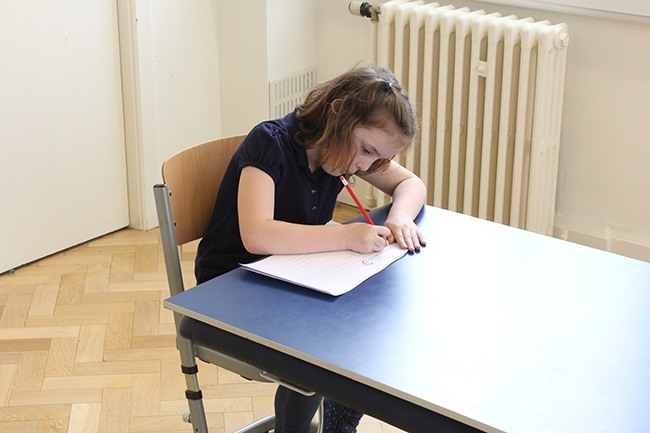
Handwriting Improvement Therapy
An occupational therapist can improve your child's handwriting. The occupational therapist would use a combination of assessment and treatment to address poor handwriting. Handwriting is a complex process and is not as simple as people think. An occupational therapist can analyse the underlying aspects behind your child's poor handwriting and offer treatment sessions to improve handwriting.
What exactly is handwriting and what does it involve?
Handwriting is the integration of a series of complex fine motor movements, visual-perceptual skills and language comprehension needed to accurately control a pen or pencil to produce representative patterns that form letters and words as a means of communication.
For a child to accurately perform such complex movements required for handwriting, they need to have developed crucial underlying skills that support the various aspects of writing. From a therapy point of view, handwriting can be broken down into three fundamental areas, language comprehension, motor skills and visual-perceptual skills. Therefore successful handwriting development must involve all three of these aspects:
Language comprehension: The ability to understand, recall and vocalise letters and words, including a distinct understanding of how letters are correctly formed, spaced and aligned on the page.
Motor skills: The ability to accurately control the hands, fingers and stabilise larger muscle groups (such as the shoulder, forearm and core) in order to provide legible and accurate writing that does not drift across the page.
Visual-perceptual skills: The visual skills needed to distinguish and comprehend lines on a page and how they relate with each other to form pictures, letters and words.
Why do we need good handwriting?
Handwriting is an important aspect of childhood, both during school life and at home, good handwriting enables your child to display their cognitive ability. Legible handwriting allows the class teacher to accurately test and analyse if the child understands set work. For example, a child who struggles to write may often be left behind in group classroom activities (such as writing a story and mental maths). Poor handwriting could lead to an inaccurate representation of your child's ability because of their difficulty to communicate through writing if they understood the concept. There are also links to further education and professional life, in English GCSE tests for example, a slow writer may struggle to record all their thoughts in the allotted time, or in professional life, medical notes are often handwritten, poor handwriting could lead to key information being misunderstood.
How can we help improve handwriting?
As an occupational therapist, we have the knowledge and expertise to not only analyse which aspects of handwriting your child is struggling with, but offer precise and tailored treatment sessions to improve handwriting. As with many difficulties, it is beneficial to address handwriting as soon as possible. There is a lot of research to support that children are capable of adapting and re-wiring their brains better than those of older age, therefore by employing therapy sooner rather than later the changes and improvements are more likely to be made.
Problems that may require handwriting help
- Poor fine motor control
- Struggles to draw circles (often looking like squares)\
- Poor legibility of writing
- Handwriting appears cramped or unusually spaced
- Writing drifting across the page
- Letters poorly formed/formed backwards
- Poor posture
- Unable to identify mistakes made
Underlying skills:
There are many underlying skills that influence good handwriting, some of which are listed below:
- Figure-ground discrimination,
- Pincer grip
- Finger strength
- Finger manipulation
- Visual perception
- Shoulder stabilisation
- Core stabilisation
- Wrist strength and control
- Pattern formation
- Acute fine motor finger control
- Pencil tripod grip
- Understanding of the importance of spacing, alignment, letter size and slope in writing
Suitable conditions that may require handwriting improvement
Below is an inconclusive list of conditions that may result in poor handwriting:
- Dyspraxia
- Dysphagia
- DCD
- Developmental Delay
- Stroke
- Spina Bifida
- Muscular Dystrophy
- Cerebral palsy
- Acquired brain/head injury
- Sensory Processing Disorder
Benefits of handwriting improvement
- Increased legibility of writing
- Able to accurately record information
- Able to display cognitive ability
- Function at a level similar to their classmates
- Improved fine motor skills
- Improved visual-perceptual skills
- Increased confidence
Summary
In summary the occupational therapist would use a combination of assessment and treatment to improve handwriting. Handwriting is the integration of a series of complex fine motor movements, visual-perceptual skills and language comprehension needed to accurately control a pen or pencil to produce representative patterns that form letters and words as a means of communication. Handwriting is an important aspect of childhood, both during school life and at home, good handwriting enables your child to display their cognitive ability. An occupational therapist can help address all of the underlying aspects of writing, offering a high quality analysis and treatment plan, if you would like to speak to one of our team regarding your child's handwriting then please email office@otforkids.co.uk or call us on 0330 223 0888

 Next steps:
Next steps:Please contact one of our experienced occupational therapists today and we will gladly discuss how we can help and what services we can offer you.
- 0330 223 0888
- office@otforkids.co.uk
- 2 Hagley Rd, Salford M5 3EY [map]







 OT for Kids have been a great help in aiding my son Jake with coping with his dyspraxia both at home and in school. They came out to our house and completed the assessment at home.
OT for Kids have been a great help in aiding my son Jake with coping with his dyspraxia both at home and in school. They came out to our house and completed the assessment at home.






